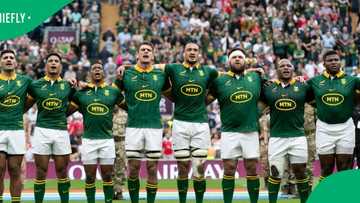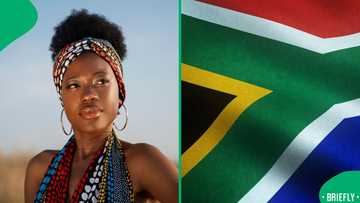Ten Years On, Is South Africa Winning the Gender Equality Battle?
A decade of progress measured in data and ongoing challenges.
Today, on United Nations Day, we reflect not only on global goals but on what they mean here at home. Among the UN’s most urgent priorities is closing the gender gap, a goal that touches every aspect of South African life.
Equality isn’t only a matter of rights; it’s a driver of progress. Studies show that when women have equal access to education, work, and leadership, entire economies grow stronger and more sustainable.
Over the past decade, South Africa has made real strides toward that vision. Drawing on a decade of data from the World Economic Forum’s Global Gender Gap Reports, Briefly News explores how far we’ve come and where gaps remain through key signs of progress and the women powering this change.
Here’s a look at the data behind South Africa’s decade of progress and what it reveals about the road ahead.
Strong global standing
As of 2025, South Africa has closed about 76.7% of its overall gender gap, meaning that women now experience roughly three-quarters of the same access as men across education, health, economic participation and political empowerment. This puts the country well ahead of the global average of 68.8%, showing that sustained policy attention and grassroots advocacy can produce measurable results even in a developing economy. Over the past decade, South Africa consistently ranked among the world’s top 20 countries for closing the gender gap. However, in 2025 it experienced a sharp decline to 33rd place, reflecting not a major regression in its own performance, but rather faster progress made by other countries in narrowing their gender gaps.
Regional leadership
Over the past decade, South Africa has consistently ranked among Africa’s top performers in advancing gender equality. Regularly, with only a few exceptions, it has placed within the top three in Sub-Saharan Africa in the Global Gender Gap Index. The country continues to lead the region with steady progress across education, health, and political representation, well above the Sub-Saharan average of around 68%.
PAY ATTENTION: stay informed and follow us on Google News!
Education parity
South Africa has reached near-total equality in education and health, with girls performing on par with boys in primary and secondary school. This progress shows what’s possible when access and policy align. But the gap widens after graduation. Fewer women enter or complete tertiary studies in high-demand fields, and even those who do often face barriers in STEM careers, leadership roles, and pay equity.
Rising in STEM
Women’s participation in STEM is improving, but the field is still male-dominated. Only about 13% of STEM graduates are women, showing that while access has grown, inclusion and mentorship remain key to closing the gap.

Read also
A young South African opened a global AMA about local life and sparked huge online interest
Political leadership
Women hold roughly 44% of seats in South Africa’s National Assembly, well above the global average of about 27.2%, placing the country among the world’s top performers for parliamentary representation. This progress reflects decades of advocacy and the strength of gender quotas, yet women remain underrepresented in senior executive and local government roles, where decision-making power is most concentrated.
Health parity
Gender gaps in health outcomes have narrowed, with South Africa close to global parity levels of 96%, reflecting better maternal and reproductive health outcomes.This is one of the country’s biggest equality wins. Improved access to healthcare, maternal services, and reproductive health has helped women live longer, healthier lives.
Entrepreneurship and innovation
Across sectors, women-led businesses are driving both economic and social change. South African women now participate in early-stage entrepreneurship at rates close to their male counterparts, according to Global Entrepreneurship Monitor data. From township startups to social enterprises, more women are moving from participation to leadership, though access to finance and scaling opportunities remain key challenges.
Visible changemakers
Beyond policy and statistics, South Africa’s progress is visible in the stories of women driving change in their communities. Campaigns like Briefly News’ Women of Wonder, launched in 2022, have spotlighted women excelling in entrepreneurship, STEM, leadership, and community service. Each year’s edition has revealed a different facet of empowerment, from women entering male-dominated industries to single mothers balancing family and careers. Together, these stories give a human face to the data on education, employment, and representation reminding us that equality is built not only in institutions, but in individual lives.
Momentum for the next phase
Economic gaps, informal work, and leadership ceilings remain. But the foundation of access and representation sets the stage for deeper structural change in the coming decade.
Even with strong progress, many women are still being left behind, especially in jobs and pay. Women earn about 20-25% less than men in South Africa per hour and are more likely to work in informal roles without steady pay or benefits. These inequalities, along with gender-based violence, show that parity in education and politics hasn’t yet translated into full equality in daily life.
Still, South African women continue to drive change across industries, communities, and governance. From entrepreneurs to engineers, activists to artists, they are not waiting for equality, they are building it. Initiatives like Briefly News Women of Wonder highlight the resilience, leadership, and innovation underpinning this progress.
As South Africa enters the next decade, one truth is clear: gains have been made, gaps remain, and closing them is essential for the country’s shared future. South Africa’s gender equality story is still being written, and its next chapter depends on turning today’s momentum into lasting change.
Source: Briefly News




